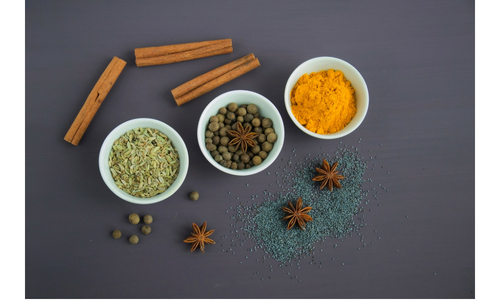Turmeric has long been used in Ayurvedic medicine, which is widely regarded as the oldest healthcare system in the world. Over recent years, it has been investigated by modern scientists, who have not only validated its beneficial properties but also given a much greater level of insight into why turmeric is so useful.
From a medical perspective, the key component in turmeric is a phenol called curcumin. Phenols are essentially a plant’s toolkit, each of them serves a practical function such as encouraging pollinators or warding off predators. Curcumin gives turmeric its bright, yellow color together with its antioxidant and anti-inflammatory properties, which are hugely useful in treating a variety of conditions including rheumatoid arthritis and diabetes.
Although curcumin is the part of turmeric which has caused most excitement, it is by no means the whole of the plant, in fact, it’s only about 2-5% of it. About 70% of the edible root is carbohydrate and another 7% is protein. The other 20% or so is a mixture of vitamins, minerals, essential oils, and resin. These are a whole lot more than just a nice extra, they pack a serious health-giving punch of their own to the point where scientists believe that turmeric would still be medically beneficial even without the curcumin.

This last point is important because a lot of the current marketing around turmeric and curcumin could give the impression that the most effective way to get the benefits of turmeric is to consume a curcumin supplement and this isn’t necessarily the case.
Basically, if you’re more interested in prevention than cure, for example, you want to ward off colds in winter, then you are probably better using turmeric itself and getting its full range of benefits. If, however, you want to treat a specific condition, then curcumin supplements are probably the way to go.
The Advantages of Curcumin Supplements
They make it easier to consume higher quantities of curcumin
You would need to eat anything between 20 and 50 portions of turmeric to get one portion of curcumin, however much that is and, of course, the more curcumin you need, the more turmeric you would need to consume to get it. By using curcumin supplements, you only get what you need without any added bulk.
They make it easier to dose consistently
This point is really an extension of the first point. If you are taking curcumin for medical reasons, there is a very strong likelihood that you will want to keep track of your dosage in order to keep an overall watch on your medical condition. Any changes to your standard dosage should be made for a specific reason, for example, arthritis patients may need a higher dosage in winter than in summer. This accuracy is far easier to achieve with curcumin supplements than with turmeric.
It also has to be noted that curcumin itself has low bioavailability, which basically means it’s hard for the body to make use of it – unless it’s combined with black pepper. Of course, you can easily mix turmeric and black pepper together, in fact, many recipes do exactly that, but this does mean that there is another factor to consider when trying to judge the accuracy of your dosage. Curcumin supplements almost invariably contain black pepper (or a derivative thereof such as Piperine) for exactly this reason.

They offer great convenience
If you commit to getting your dose of curcumin through turmeric itself then you basically commit to consuming turmeric. Whether you feel like it or not and while there are a lot of different ways you can do this, at the end of the day, there’s a good chance you’ll come up against times when you just have to eat turmeric whether you want to or not. In fact, you’re probably committing to eating turmeric and black pepper to enhance bioavailability, which is certainly doable but may not be at all convenient.
The quality is totally consistent and reliable
This importance of this point should not be underestimated by those using curcumin for medical purposes. The quality of fresh turmeric, like the quality of any foodstuff, can vary widely depending on a number of factors including how it is grown, how it is transported, how it is stored, how old it is and how it is prepared. The same comments apply to any product derived from turmeric, including curcumin supplements.
The key point to understand with curcumin supplements, however, is that reputable manufacturers work very hard to ensure that each batch of supplements they produce is of exactly the same quality. Basically, their reputation depends on it.
As a final point, it’s worth noting that there is nothing to stop medical users from also incorporating turmeric itself into their diet so they can also benefit from its additional medicinal qualities.













![Best Crochet Hooks for Beginners and Pros [2020 Update] best crochet books](https://www.awebtoknow.com/wp-content/uploads/2018/01/best-crochet-books-100x70.jpg)


